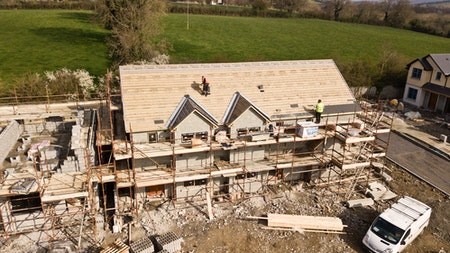Finding the right builder is one of the most critical decisions you will make as you plan to implement your property reconstruction or ownership ambitions. When you hire the services of a professional builder, you can be sure that they will provide quality service in every way. The right builder will stay guided by a wealth of knowledge and experience gained over the years to protect your investment and ensure you’re satisfied with the final result.
A good builder will also:
- Collaborate closely with architects
- Keep plan development on schedule
- Provide unique design ideas
- Produce initial estimate based on preliminary design
- Provide valuable construction expertise & insight
- Offer value-engineering & cost-saving options
- Suggest high-performance home specs
- Mitigate potential constructability issues
- Recommend the right building materials
What types of builders are available?
The one-man band
These solo traders are exactly as they sound - a lone contractor who’s able to handle the work by themselves. These kinds of builders are best used for small projects, usually renovations, but could be an option for small scale extensions - depending on their skill level.
Many homeowners find themselves considering a one-man band, as they’re the cheapest option when it comes to construction. But like all things, these cost-effective prices do come with their own drawbacks. With limited man-power, these builders usually only take on one job at a time.
A builder with some help
A builder with some help will often grow their business quite organically. They’ll start off small and, as they get more jobs, slowly identify labourers and other traders that are reliable, who they’ll then put in charge of a site so that the main builder can go and work on other homes.
With the right company, this could be a great advantage to your home. In the middle of growing their business, these contractors are often very ambitious and keen to make a positive impression. This means you get a great service for a very competitive price.
Building contractor with sub-contractors
These are a great choice for homeowners who want more a professional touch (not to mention, some extra security). They offer a mix of organisation, budget, and reliability, thanks to being typically well established with proven experience.
If you do go for this kind of company, one thing you do need to watch out for is sub-contractors. While in most cases, these are nothing to worry about, you do need to make sure they’re fully accounted for in your contract. You’ll want to know if their costs are being included into your quote, plus if they’re covered by the same insurance.
Fully established contracting firm
These guys are the cream of the crop and the number one recommendation for any large home project. Though you’ll pay more for their premium service, their expertise will be hard to beat, and their size means you’ll be able to secure a payment plan that keeps you and your budget safe from bad practices.
As a large-scale business, contracting firms will have a range of builders, ground-workers, and labourers on hand for your home. This means they often complete projects ahead of their smaller, local competition.
What’s the best way to go about looking for a builder?
Looking for the right builder comes down to what type of construction you plan to undertake. A simple and small-scale painting and paving job may not require fully established firms, but if you are embarking on a major building and construction job, you will need to follow the right steps.
The construction industry is well regulated in this country and homebuilders are evaluated before they are deemed capable and competent enough to operate.
Industry experts say the best way to find a competent builder is by contacting the National Home Builders Registration Council (NHBRC). This organisation was established to protect homebuilders and to set and maintain construction quality standards in the building industry. It is an independent, non-profit, non-government organisation, established to assist homebuilders when a registered contractor defaults on his contract or fails to rectify certain faults. Builders and remodelling contractors registered with the NHBRC will guarantee that they will carry out the following in terms of the standard homebuilder's warranty:
- Make good any defects related to plans, specifications workmanship and materials occurring within 90 days of occupation
- Repair any roof leaks occurring within 12 months of occupation and
- Provide a five-year warranty on the structural integrity of the new house.
As a condition of registration with the NHBRC, the builder must issue a standard home builder’s warranty (SHBW) on the new home. This defect warranty forces the contractor to give the customer a five-year guarantee that any structural defects will be rectified by the contractor, for the contractor’s own account. The party which signs the contract, whether it builds the dwelling or not, is the party responsible for supplying the SHBW and should by implication be registered with the NHBRC. A unit enrolment certificate will be issued by the NHBRC after the SHBW has been registered.
It is important for owners to understand that photocopies of the warranty or enrolment certificates will be accepted as the original documents are a prerequisite for registration. No party may waive the SHBW.
Using building contractors registered with the NHBRC, who have agreed to abide by all the rules and regulations laid out by the body, offers homeowners peace of mind. This is due to registered homebuilders agreeing to build the house to a minimum quality standard that has been set out in the NHBRC's Home Building Manual.
If something goes wrong during the building process and the builder refuses or is unable to assist, a valid complaint may be raised and the NHBRC will investigate. It's worth remembering that a valid complaint is one that relates to defects caused or likely to cause major structural damage.
General tips to keep in mind when dealing with builders
1. Don’t approach a builder too soon. The best thing to do is to approach builders once you have a set of drawings and a list of what will and will not be included. Otherwise, you may base the project on a figure that could be miles off the eventual cost.
2. Consider the scope of the project. Find the right kind of building company for your project. You must look for the most appropriate balance of low price, high quality and good organization. You never get the best of all three, but it’s key to decide what will be the best fit for you.
3. Establish whether you need a specialist or just a general builder. A really good general builder is suitable unless the work in question is unusual. The most important thing is to find someone who will do good work for the right price.
4. Aim for one point of responsibility. Rather than using one general contractor, it may seem wise to try to save money by directly engaging separate tradespeople, such as plasterers, electricians and carpenters.
5. Let the builder manage the project. Views about what project management actually involves can vary, but the most important manager of a project is the main building contractor. It’s the builder’s responsibility to make sure that the right people in the right numbers are on-site at the right times, and that they have the necessary materials to do their work.
6. Embrace bidding. Competitive bidding is the process of getting alternative prices from different builders for the same work. Clearly, it’s crucial that the information against which they are pricing is absolutely clear and specific. Otherwise how can two prices compare?
7. Understand the importance of a building contract. A building contract is simply an agreement between a builder, who agrees to undertake a specific set of works, and a client, who agrees to pay a set amount of money. The important thing the contract does is set out the “what ifs” —such as, what if the work is changed along the way? What if it takes longer than agreed?
8. Make one comprehensive inspection list. More arguments happen at the final stage than at any other time in a project, so it’s important to be ready for the common pitfalls. When the main work is going full tilt, everyone tends to be happy, but toward the end of a project, there are typically a thousand small items to attend to. Go around with your builder and agree on one comprehensive list. Of course, additional things may come to light, but it’s also not really fair to keep coming up with ever more items over time.
With the guidelines provided above and various legal frameworks in place, finding the right builder and completing your building plans must be stress free.




